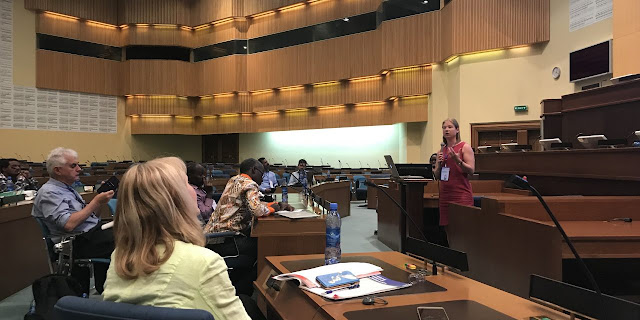GATE at World Press freedom day: STRENGTHENING THE MONITORING OF SDG 16.10.1
In her role with CFOM (the University's Centre for Freedom of the Media, hosted in the department of Journalism Studies), Diana Maynard travelled to Ethiopia together with CFOM members Sara Torsner and Jackie Harrison to present their research at the World Press Freedom Day Academic Conference on the Safety of journalists in Addis Ababa, on 1 May, 2019. This ongoing research aims to facilitate the comprehensive monitoring of violations against journalists, in line with Sustainable Development Goal (SDG) 16.10.1. This is part of a collaborative project between CFOM and the press freedom organisation Free Press Unlimited, which aims to develop a methodology for systematic data collection on a range of attacks on journalists, and to provide a mechanism for dealing with missing, conflicting and potentially erroneous information.
Discussing possibilities for adopting NLP tools for developing a monitoring infrastructure that allows for the systematisation and organisation of a range of information and data sources related to violations against journalists, Diana proposed a set of areas of research that aim to explore this in more depth. These include: switching to an events-based methodology, reconciling data from multiple sources, and investigating information validity.
Whereas approaches to monitoring violations against journalists traditionally uses a person-based approach, recording information centred around an individual, we suggest that adopting an events-based methodology instead allows for the violation itself to be placed at the centre: ‘by enabling the contextualising and recording of in-depth information related to a single instance of violence such as a killing, including information about key actors and their interrelationship (victim, perpetrator and witness of a violation), the events-based approach enables the modelling of the highly complex structure of a violation. It also allows for the recording of the progression of subsequent violations as well as multiple violations experienced by the same victim (e.g. detention, torture and killing)’.
 |
| Event-based data model from HURIDOCS Source:
|
Another area of research includes possibilities for reconciling information from different databases and sources of information on violations against journalists through NLP techniques. Such methods would allow for the assessment and compilation of partial and contradictory data about the elements constituting a given attack on a journalist. ‘By creating a central categorisation scheme we would essentially be able to facilitate the mapping and pooling of data from various sources into one data source, thus creating a monitoring infrastructure for SDG 16.10.1’, said Diana Maynard. Systematic data on a range of violations against journalists that are gathered in a methodologically systematic and transparent way would also be able to address issues of information validity and source verification: ‘Ultimately such data would facilitate the investigation of patterns, trends and early warnings, leading to a better understanding of the contexts in which threats to journalists can escalate into a killing undertaken with impunity’. We thus propose a framework for mapping between different datasets and event categorisation schemes in order to harmonise information.
In our proposed methodology, GATE tools can be used to extract information from the free text portions of existing databases and link them to external knowledge sources in order to acquire more detailed information about an event, and to enable semantic reasoning about entities and events, thereby helping to both reconcile information at different levels of granularity (e.g. Dublin vs Ireland; shooting vs killing) and to structure information for further search and analysis.
Slides from the presentation are available here; the full journal paper is forthcoming.
The original article from which this post is adapted is available on the CFOM website.
The original article from which this post is adapted is available on the CFOM website.



